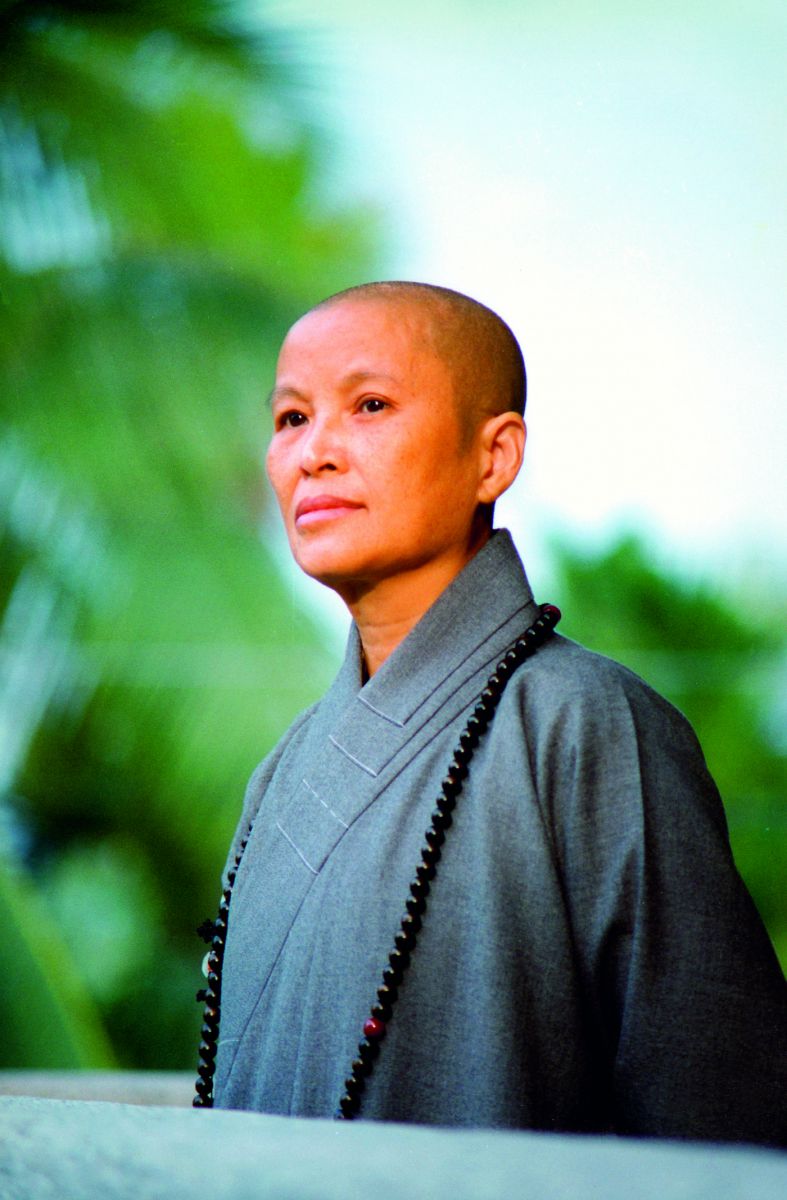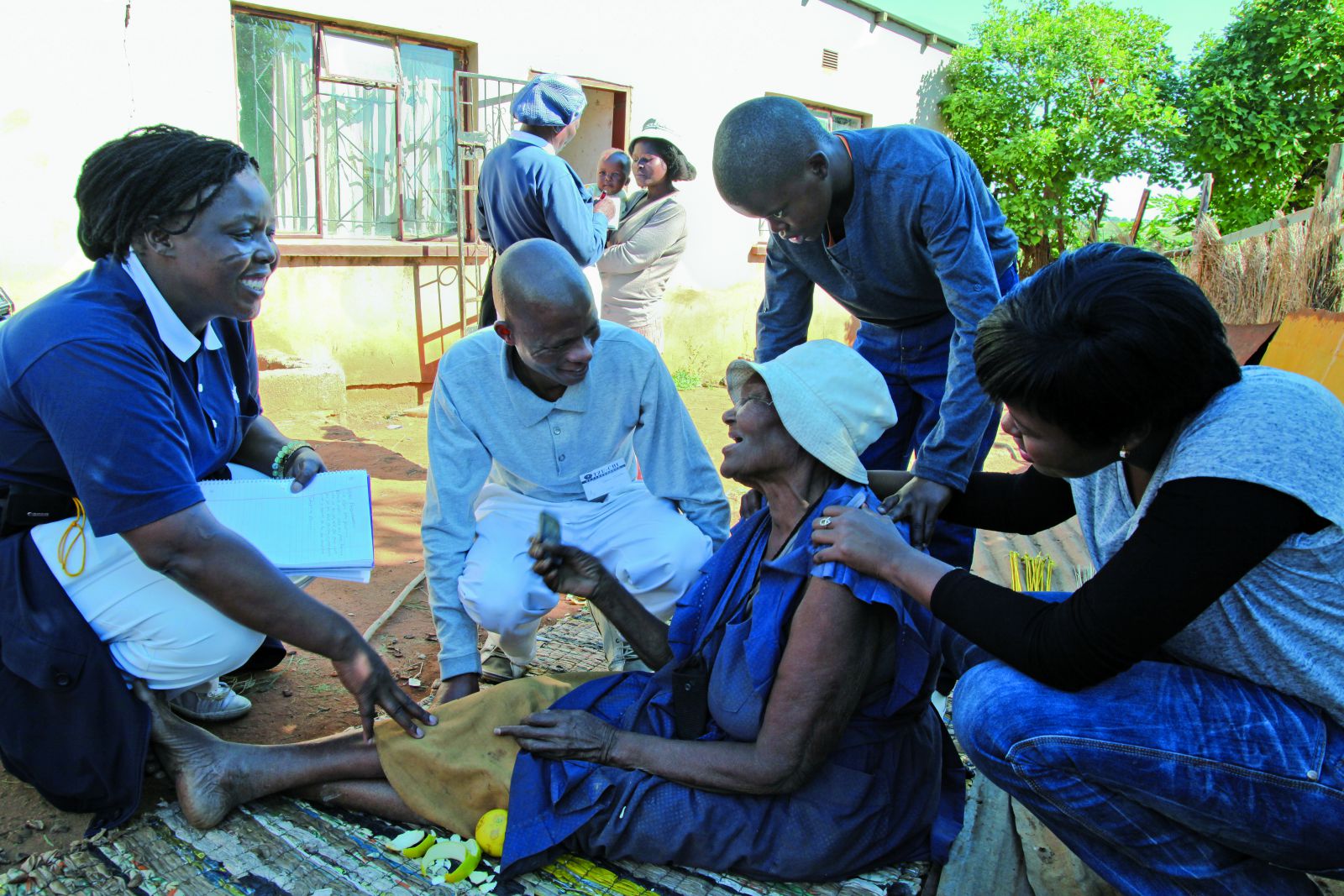

| Cultivate Goodness to Protect the World | |||||||
| By Dharma Master Cheng Yen Translated by Teresa Chang | |||||||
In September, 130 African volunteers from Zimbabwe, Mozambique, Lesotho, and South Africa gathered in Johannesburg for a training camp for Tzu Chi cadre members. The branch office was not big enough to accommodate all the participants, so a big white tent was put up outside. The environment was far from comfortable, but the participants maintained their best postures and listened attentively during the classes, which were interpreted from English to Zulu (a native language of South Africa) and Sena (a native language of Mozambique). They learned about Buddhist etiquette, the Jing Si Dharma Lineage, Tzu Chi principles, and medical and hygienic knowledge needed when visiting and caring for aid recipients. They chanted the Sutra of Immeasurable Meanings in Chinese even though they did not speak the language. They also did the walking meditation, with their steps in unison. In recent years, seeds of Tzu Chi have been sprouting and growing vigorously on the African continent. An increasing number of local Africans are working to become living bodhisattvas. Although their nationalities and languages are different from those of ours here in Taiwan, where Tzu Chi originated, they are also eager to learn about and live out the Buddha’s teachings. I am amazed at how things work out, to witness bodhi seeds putting down roots in Africa. Some South African volunteers shared their stories at the camp. They said that they used to live harsh lives, suffering both physically and emotionally. But after they joined Tzu Chi, they learned to open their hearts and go into communities to serve the old and weak. By giving to others, they received abundant spiritual joy. Additionally, volunteers from Zimbabwe said that they were grateful to Tzu Chi volunteer Tino Chu (朱金財) for bringing Tzu Chi to Zimbabwe and for caring for their fellow countrymen. As a way of paying back, they said they would follow Chu’s example and do their best to help the needy. In over a year, our volunteers from South Africa have made more than 20 trips to Swaziland to care for the needy there and to inspire people to do good. They were met with many difficulties when they started, and the locals treated them with cold indifference. But they did not give up. Now our South African volunteers have inspired quite a few people in Swaziland to join their ranks and follow them in visiting the needy and distributing aid. With the additional help, they have been better able to spread love in Swaziland. Everyone has the same buddha-nature. By working and giving together, we can be like the bodhisattvas and relieve suffering wherever it is, wherever there are cries for help. Despite their poverty, our volunteers in South Africa reach out to help and care for people who are as needy as they are. They give to them respectfully. Their actions show how rich they are in heart. Their spiritual wealth has enabled them to transcend their material poverty and live an abundant life. In contrast, if you are rich materially but still crave more wealth and spend your life in meaningless pursuits, you are poor in heart no matter how much money you have. I hope more people aspire to be bodhisattvas and go amongst people to serve them. We can compare our wisdom to the bright sun and our compassion to the full moon. If we exercise our wisdom and compassion to do good, we will be able to light up the dark corners of the world.
A house on fire Mr. Ma, 67, lives in Beijing, China. He takes care of his wife and daughter, who are both ill. The house they live in is a hundred years old. After years of neglect, it fell into disrepair and there was dust everywhere. After learning about their situation, local Tzu Chi volunteers helped the family clean up and repair the house, giving the residence a new look. Mr. Ma said happily that the house looked even better than it did on the day he married his wife. From what he said, we surmised that the house was already wearing out when he was young. As the years went on, the lack of maintenance and care took its toll and it fell into worse disrepair. Fan Xiaoming (范曉明) was one of the volunteers who helped with the cleanup. He said he was touched to see how selflessly and unconditionally Ma gave to his wife and daughter. His good example made Fan reflect on his attitude toward his own mother. He used to complain about her, but now he realized how indebted he was to her for bringing him up. Fan realized that instead of complaining about her, he should care for her the best he could. Taking action to repent of our wrong ways and correct ourselves is like a house being cleaned of dust and refurbished. The house becomes beautiful again, just as we do when we improve ourselves. As long as we can be mindful of our thoughts and behaviors and nurture goodness in our hearts, we will be able to bring blessings to the world and happiness to others. A parable in the Lotus Sutra goes like this: There once was an old man with immeasurable wealth, many estates and a large number of servants. He had a spacious house, but it had only one entrance. Many peopled lived there, sometimes 100, 200, or even 500 people at a time. Despite the man’s wealth, the building was in bad repair—the walls were crumbling, the pillar bases were decaying, and the roof beams were tilting. Suddenly and unexpectedly, fires broke out everywhere, consuming the house…. This parable describes not only the physical world but our minds as well. Under the sky and above the earth, our world is like a big house in which all living beings live together. Today, this world of ours is beset by natural and man-made disasters. It’s like a house on fire—very dangerous. All living beings on this earth share a collective karma. When people’s negative, unwholesome thoughts accumulate, they create a powerful force. This is the power of collective karma that the Buddha speaks of. This powerful negative force leads to disasters and calamities that can destroy everything. If people don’t love one another and take responsibility for the wellbeing of the world, if they fail to cherish and love this global house of ours, it will not only rot and fall apart, but it will even catch fire. The world’s population is growing, but the overall morals and ethics are declining. Many people, lacking self-control, stray from the right path in life and as a result create a lot of bad karma. When the ignorance of many people converges, it’s like fires burning off wholesome thoughts. Conflicts and confrontations then arise, leading to wars and other disasters that displace and torment countless people. Conflicts and wars within or between nations may be limited to a certain area, but natural disasters such as earthquakes, floods, fires, and hurricanes—which arise out of the imbalance of the Four Elements of Earth, Water, Fire and Wind—know no bounds. The scale of destruction they bring is beyond imagination.
Based on the Buddha’s teachings, we can summarize the principles of all things with a framework of three dimensions and four phases. In the physical dimension, everything in the universe goes through the stages of formation, continuation, decay, and extinction. In the mental dimension, thoughts and feelings arise, remain, change, and disappear. In the bodily dimension, life cycles go through birth, aging, illness, and death. Everything is subject to change; human metabolism continues at all times, and the cells in our bodies constantly change. Nothing is permanent. Yet despite the impermanence, despite the limited length of our life, we can always increase the depth and breadth of our life by making the best use of it. If we seize time to walk the Bodhisattva Path, if we care for the world the best we can, our wisdom will grow and we will contribute to the welfare of mankind. Though we may age and eventually leave this world one day, the good we do will benefit the world for a long time to come. Do not create bad karma and disturb the world. Instead, create good karma and protect and guard the world. If we exploit the resources of the earth without restraint, if all we care about is our own pleasures and comforts, then the world around us will be like that house on fire. But if we cherish all things with a grateful heart and make good use of all resources to help suffering people, we will dissolve the crisis of the burning house. It’s all up to us if the Four Elements of the world can be in balance and if peace and harmony can prevail in our nation, society and families. It all comes down to the states of people’s minds. Don’t live in your own small world and pursue happiness and peace only for yourself, your family, or your nation and society. Instead, spread your love and care to the whole world. Its welfare concerns all of us. Don’t be careless with your time, either. Seize every minute and second to benefit the world. Then you’ll live a valuable life that has both depth and quality.
Refrain from being wasteful October 16 is World Food Day. This day serves to remind us to cherish the food we eat, because it does not come so easily to everyone. Our planet produces enough food to feed everyone on it. However, statistics show that over 30 percent of the food is wasted every year. As a result, of the 7 billion people in the world, more than 800 million live in starvation. A short film was once made in the Philippines. Two female customers entered a restaurant, ordered some fried chicken, and ate only a little. The rest was thrown away as kitchen waste. At the end of the day, a man came to collect all the kitchen waste the restaurant had produced. When he returned to the countryside where he lived, a group of poor kids were waiting eagerly to eat that waste. To them, it was a sumptuous meal. Poor people don’t have enough to eat, but rich people throw away precious food. The contrast between the two worlds wrenches one’s heart. Such wastefulness shows deluded minds and an inability to tell right from wrong. Wasteful behavior and careless use of the world’s resources will lead to natural disasters for the world. I appeal to everyone to eat until just 80 percent full and use the money saved from the remaining 20 percent to help the needy. That way, our world will have fewer starving people. Eating until we’re less than completely full is good for our health too. Furthermore, let’s adopt a vegetarian diet. Refraining from taking lives helps us cultivate our compassion. An added benefit is that we can decrease the pollution from livestock farming. To save the world, we need to transform people’s minds. I hope everyone will clear away their mental defilements and afflictions and let the light of wisdom shine through. Let us take the Dharma to heart, live it out, and encourage one another to put the love in our hearts into action. Let us be ever more mindful. (This article is excerpted from a series of speeches delivered by Master Cheng Yen from October 1 to 21, 2013.) |














|


.jpg)

.jpg)